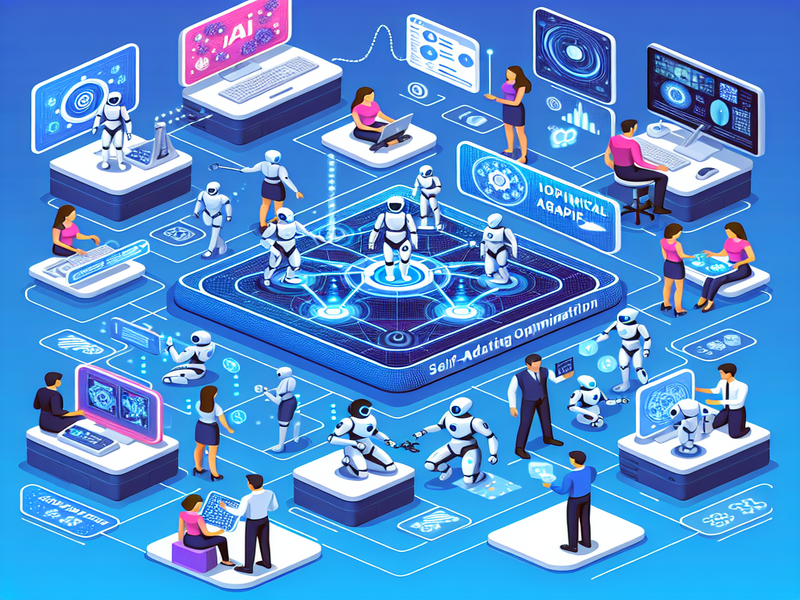- Updated: July 27, 2024
- 4 min read
Tracing the Path to Self-Adapting AI Agents
Unleashing the Power of Self-Adapting AI Agents with the Trace Framework
The realm of artificial intelligence (AI) is rapidly evolving, and a new frontier has emerged – self-adapting AI agents. These intelligent entities are poised to revolutionize the way we approach complex tasks and solve intricate problems. At the forefront of this groundbreaking technology is the Trace framework, a pioneering innovation from Microsoft Research and Stanford University.
Introduction to Self-Adapting AI Agents
Self-adapting AI agents are intelligent systems that possess the remarkable ability to learn, evolve, and optimize their behavior based on interactions with their environment. Unlike traditional AI models, which are trained on static data and follow predefined rules, these agents dynamically adapt and refine their strategies in real-time, leveraging feedback and experience to continuously improve their performance.
The key to unlocking the potential of self-adapting AI agents lies in the Trace framework. This groundbreaking approach treats AI systems as computational graphs, akin to neural networks, and optimizes them end-to-end through a generalized back-propagation technique. By propagating minimal subgraphs instead of gradients, Trace overcomes the limitations of traditional optimization methods, enabling the dynamic adaptation of AI systems to varying inputs, parameters, and feedback types.
Overview of the Trace Framework
The Trace framework introduces a novel mathematical formulation called Optimization with Trace Oracle (OPTO), which enables end-to-end optimization of AI systems with general feedback, including numerical losses, natural language, and errors. This versatile approach allows for the optimization of heterogeneous parameters, such as prompts, codes, and hyperparameters, within AI systems.
Implemented as a Python library akin to PyTorch, Trace empowers users to create and refine AI systems with ease, much like training neural networks. By leveraging this powerful tool, developers can build AI agents that learn and adapt from their experiences, eliminating the need for specialized engineering and manual fine-tuning.
Applications of Trace in Various Fields
The applications of self-adapting AI agents powered by the Trace framework are vast and diverse. From gaming and robotics to household tasks and marketing, these intelligent agents are poised to revolutionize numerous industries.
In the gaming industry, Trace-optimized agents can learn complex strategies for games like Battleship, outperforming traditional approaches. For robotics, Trace enables super-fast reinforcement learning, allowing agents to learn control policies for robotic manipulators in just dozens of episodes, a remarkable 1,000 times speedup compared to conventional methods.
Moreover, Trace excels in optimizing multi-agent systems, such as Large Language Model (LLM) agents tasked with completing household tasks in simulated environments. By automatically constructing interaction graphs and updating agents’ behaviors based on environmental feedback, Trace facilitates the emergence of pro-social behaviors, role specialization, and efficient collaboration among agents.
In the realm of marketing, self-adapting AI agents can revolutionize content creation, personalization, and customer engagement strategies. By continuously learning from user interactions and feedback, these agents can tailor their approach to deliver highly relevant and engaging experiences, driving business growth and customer satisfaction.
Benefits of Self-Adapting AI
The adoption of self-adapting AI agents powered by the Trace framework offers numerous benefits across various industries:
- Increased Efficiency: By dynamically optimizing their behavior, self-adapting AI agents can complete tasks more efficiently, reducing the number of actions and interactions required, leading to improved productivity and resource utilization.
- Continuous Improvement: These agents continuously learn and refine their strategies based on feedback and experience, ensuring ongoing performance enhancement and adaptation to changing environments.
- Reduced Engineering Effort: With Trace, developers can focus on defining the overall system architecture and objectives, while the agents automatically optimize their behavior, minimizing the need for specialized engineering and manual tuning.
- Enhanced Collaboration: Multi-agent systems optimized by Trace exhibit emergent pro-social behaviors and role specialization, fostering efficient collaboration and task completion.
- Adaptability to Dynamic Environments: Self-adapting AI agents can seamlessly adapt to varying inputs, parameters, and feedback types, making them well-suited for dynamic and complex environments.
Conclusion
The Trace framework represents a paradigm shift in the field of artificial intelligence, ushering in a new era of self-adapting AI agents. By enabling end-to-end optimization of AI systems with general feedback, Trace empowers these intelligent entities to learn, evolve, and optimize their behavior based on interactions with their environment.
From gaming and robotics to household tasks and marketing, the applications of self-adapting AI agents are vast and diverse. As businesses and industries embrace this groundbreaking technology, they can unlock unprecedented levels of efficiency, continuous improvement, and adaptability, paving the way for a future where intelligent agents seamlessly collaborate and optimize their strategies to tackle complex challenges.
Unleash the power of self-adapting AI agents with the Trace framework, and embark on a journey of innovation, where the boundaries of artificial intelligence are continuously pushed, and the possibilities are limitless.

